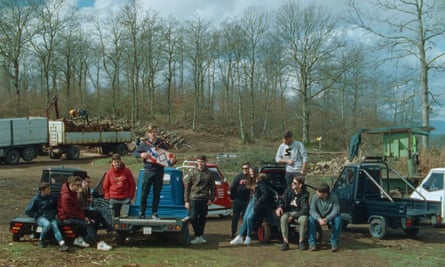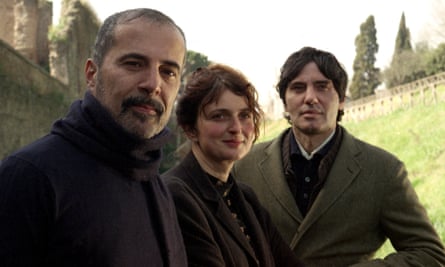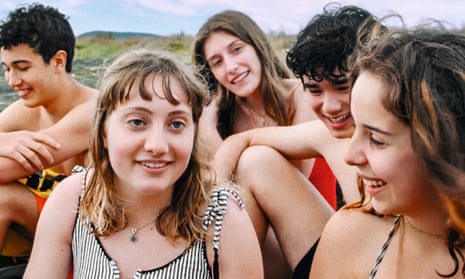In February 2020, three celebrated Italian film-makers began work on a movie that would give voice to a generation they felt was not often seen, and even less often heard. Pietro Marcello, Francesco Munzi and Alice Rohrwacher had left acclaimed individual projects – Marcello’s sweeping proletarian epic Martin Eden (2019), Munzi’s slow-burning crime drama Black Souls (2014) and Rohrwacher’s magic-realist countryside fable Happy as Lazzaro (2018) – to begin work on a film that featured young people across Italy speaking about their hopes, fears and thoughts about the future.
The three wanted to capture the mood of a moment in history; to produce a document that later generations would refer back to. Then as the weeks passed, and news of a virus began dominating the headlines, they found themselves in the curious position of asking teenagers about their hopes for the future at a moment when time itself felt frozen, and what was coming next seemed increasingly uncertain.
The result is Futura, a quietly hopeful documentary that takes us across varying landscapes all over Italy – sprawling apartment blocks in Rome, verdant farmlands in Tuscany, unusually quiet canals in Venice – and shows young people sharing their opinions about the world today.
They speak about their fears of growing into middle-aged men who hate their jobs, and being disappointed by politicians. A trainee mechanic worries that his profession will soon be taken over by robots; young immigrants argue about whether the world would be better if we got rid of money. As the pandemic hits, a group of socially distanced, masked chefs at a culinary school long for a more carefree time. When summer emerges, teenagers slowly return to the streets, trying to end the loneliness that marked their long months of isolation.

Marcello, Munzi and Rohrwacher had two aims when they first met in 2019 to map out the beginnings of Futura, they tell me over Zoom. The first was to make a truly collaborative film. “The ideology was to do something not in competition, but in a sense of mutuality,” Marcello says. “We were like a family when we were working together.” Their aim was to give a voice to a new generation. They located people aged 15 to 20 across the country, an age range that Rohrwacher describes as covering the formative “moment of becoming” between childhood and adulthood. And, crucially, they wanted to know how these people thought about the world. “Children are nowadays very fluent in telling their own stories; they use social media all the time,” Rohrwacher says. “However, very few people ask them for their opinions.”
Decades ago, at the start of the sexual revolution of the 1960s, director Pier Paolo Pasolini travelled the country to ask Italians what they thought of sex. His Love Meetings (1964) may be an obvious historical counterpart to Futura, but the directors did not take too much from it. For them, Rohrwacher says, Pasolini remains “a big maestro”, but his film set out to “be provocative and test out a personal thesis”.
Futura was more closely inspired by sociological documentaries by Mario Soldati and Luigi Comencini on Italian TV in the 60s and 70s: these were more guided by the voices of the interviewees than any directorial presence. Beyond wanting to give young people a voice, the three directors of Futura had no specific arguments in mind. They are rarely seen on screen, although their disembodied voices are occasionally heard, gently shaping the conversations.
While Futura does not set out to prove a thesis, certain patterns emerge. One is the significant role of social standing in shaping a person’s sense of self, and of the world. A group of chatty young equestrians in Turin express an easy belief in the law’s ability to protect them; in Milan, students occupying their high school in protest at its Covid-induced closure talk about feeling abandoned. “Panic attacks and anxiety are rising,” one says. There are no jobs and “to better your social status is really hard”.

We see some hints as to why the future may seem so parlous to this generation. There are the frustrations about being stuck in economic precarity; there are scenes of a climate protest. Others speak about feeling downtrodden by the comparison game of social media, and the anxiety sparked by the pandemic. “Ours is a disillusioned generation,” says an arts student. “We really don’t believe we can do something.” Some discussions centre on Italian politics specifically, but the interviews also capture a feeling shared globally. “Children are the same all over the world,” says Marcello.
Was it hard to hear so many young people be so pessimistic? Marcello points to the profusion of images, content and news today as part of the problem. “Their imaginary world is nowadays somewhat manipulated by the media – it was much easier for us to create our own imaginary worlds. I feel that children today have been robbed of this freedom because their imaginary world is built for them, and it’s filled with commodities and the idea of consumption.” In Futura, one teen says of social media: “Being always connected is not healthy. Minding other people’s business is fucking insane.”
The pandemic made things worse. “There was also loneliness during the [second world] war – my father went through it, and my grandparents,” says Marcello. “But after the bombing, people could go back and live again. Whereas the pandemic was an unknown situation, and the difficulty was not knowing the consequences of what would happen in the future; it felt as if we were all in limbo, suspended.” It can be a difficult reality to confront, but the directors feel it is true to the spirit of what they wanted to do. For Rohrwacher, “the objective of our filming was to look at this moment of time, create a record and be witness to what was happening.”
Yet there are moments of levity and beauty in Futura, too, from the arresting portraits of everyday life – a carnival in the countryside, complete with a raucous tug of war between the old and the young – to the shared laughter among friends, and the importance the teenagers place on their relationships with family. Fittingly for a film that was prompted by a desire to work together without ego, we also see young friends talk about wanting to recover a sense of collectivism in an era of individualism. “We observed that it was more difficult for the children to say ‘us’, to talk in that collective sense,” Munzi says. “It was much easier for them to speak in the first person, to say ‘I’, ‘me’. We felt this sense of collectivity has somehow been lost.”

One of the last interviews in Futura, with a group of choral singers in Genoa, contextualises these discussions. Twenty-one years ago, as the city prepared to host the G8 summit of 2001, an estimated 200,000 people representing 700 groups around the world marched into the city to protest about globalisation (Tony Blair famously called them “a travelling circus of anarchists”). Futura compiles archival footage of the hopeful marches on the day, and then scenes of the bloody aftermath when riot police came in; hundreds were wounded, one man was shot dead.
The protests gripped the world, but when Rohrwacher asks the singers what they think about what happened right where they are standing, in 2001, there is an awkward pause. No one knows what she is talking about: “We were born between 2002 and 2003.”
Although the young singers do not remember it, the legacy of Genoa’s 2001 protests appears to hover over them, and over the others in Futura, like a ghost. Theirs is a generation born in a world of fierce economic competition, which celebrated the entrepreneurial individual breaking free of the collective; it is also a generation that feels all the ambient precarity, political anxiety and ascent of individualism that this brought.
And yet as they grapple with the legacy of the world around them, some of Futura’s teenagers express a real hunger to create a new one: “We’re full of energy,” one says. “It’s our damn turn now.”
Futura is in cinemas now.
